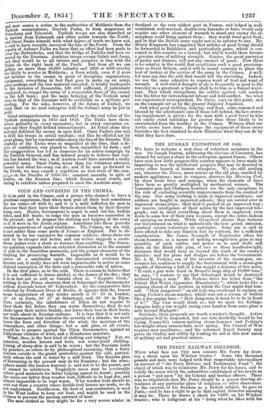THE RUSSIAN EXPOSITION OF 1855.
WE have to welcome a new class of volunteer assistance in the war. Sir Joseph Paxton, addressing the electors of Coventry, has claimed for science a share in the enterprise against Russia. Others have seen how little progress this country appears to have made in imparting to war the intellectual progress that may be descried in every other branch of human enterprise. We are still sending out, observes the Times, more armies on the old plan, unaided by modern appliances ; men to conquer, observes the Morning Post, by sheer brute force and courage, when the elements of force have been so greatly multiplied by mechanical science. The Lancaster gun and Chalmers howitzer are the only exceptions to the rule of excluding scientific improvements from the conduct of the war. Our army clothing is made in improved machines; our soldiers are taught in improved schools; they are carried over in improved steam-ships; their food is packed in an improved way ; we receive intelligence of their action by the last improved tele- graph; and in short everything about them is improved, even down to some few of their own weapons, except the entire fashion of carrying on warfare. While theoretical science thus lectures our Government on what is undoubtedly the true grand omission, , practical science volunteers its assistance. Some one is said to have offered to take any Russian fort by contract, for a sufficient consideration. Mr. James Nasmyth of Manchester offers his steam-hammer, as a means of making wrought-iron guns in any quantity, of such calibre and power as to send shells and shots on the Minie rifle plan, of two or three hundredweight, distances that would keep us beyond the reach of the enemy's missiles: and his plans and designs are before the Government. Mr. A. M. Perkins, son of the inventor of the steam-gun, an- nounces his readiness to supply the Government with a steam-gun capable of throwing a ball of a ton weight a distance of five miles. "If such a gun were fixed in Bruners large ship of 10,000 tons," he says, "I venture to say that Sebastopol would be destroyed without losing a man." Mr. Perkins dates his letter from "the Patent Hot-Water Apparatus Manufactory "; which looks like a cunning threat of the position in which the Czar might find him- self. "How dangerous ! " an old lady was overheard to exclaim on seeing Perkin's steam-musket, which sent out a stream of bullets like a fire-engine hose—" How dangerous it must be to be in front of it !" The Czar would think so ; but we spare his feelings. Imagine balls a ton weight racing over London from some place a mile beyond Highgate !
Seriously, these proposals are worth a winter's thought. Active operations will be suspended, but our vote decidedly would be for trying Nasmyth's cannon-making steam hammer and Perkina's ton-weight steam cannon-balls next spring. The Council of War requires new auxiliaries ; and the reformed Royal Society may prove its vitality and utility by lending its aid in this new union of military art and practical science.


































 Previous page
Previous page